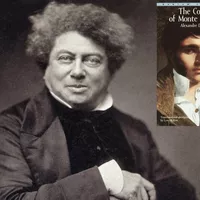Chapter 13. The Hundred Days (2)
"Edmond Dantes." Villefort would probably have rather stood opposite the muzzle of a pistol at five-and-twenty paces than have heard this name spoken; but he did not blanch.
"Dantes," repeated he, "Edmond Dantes." "Yes, monsieur." Villefort opened a large register, then went to a table, from the table turned to his registers, and then, turning to Morrel,--
"Are you quite sure you are not mistaken, monsieur?" said he, in the most natural tone in the world.
Had Morrel been a more quick-sighted man, or better versed in these matters, he would have been surprised at the king's procureur answering him on such a subject, instead of referring him to the governors of the prison or the prefect of the department. But Morrel, disappointed in his expectations of exciting fear, was conscious only of the other's condescension. Villefort had calculated rightly.
"No," said Morrel; "I am not mistaken. I have known him for ten years, the last four of which he was in my service. Do not you recollect, I came about six weeks ago to plead for clemency, as I come to-day to plead for justice. You received me very coldly. Oh, the royalists were very severe with the Bonapartists in those days." "Monsieur," returned Villefort, "I was then a royalist, because I believed the Bourbons not only the heirs to the throne, but the chosen of the nation. The miraculous return of Napoleon has conquered me, the legitimate monarch is he who is loved by his people." "That's right!" cried Morrel. "I like to hear you speak thus, and I augur well for Edmond from it." "Wait a moment," said Villefort, turning over the leaves of a register; "I have it--a sailor, who was about to marry a young Catalan girl. I recollect now; it was a very serious charge." "How so?" "You know that when he left here he was taken to the Palais de Justice." "Well?" "I made my report to the authorities at Paris, and a week after he was carried off." "Carried off!" said Morrel. "What can they have done with him?" "Oh, he has been taken to Fenestrelles, to Pignerol, or to the Sainte-Marguerite islands. Some fine morning he will return to take command of your vessel." "Come when he will, it shall be kept for him. But how is it he is not already returned? It seems to me the first care of government should be to set at liberty those who have suffered for their adherence to it." "Do not be too hasty, M. Morrel," replied Villefort. "The order of imprisonment came from high authority, and the order for his liberation must proceed from the same source; and, as Napoleon has scarcely been reinstated a fortnight, the letters have not yet been forwarded." "But," said Morrel, "is there no way of expediting all these formalities--of releasing him from arrest?" "There has been no arrest." "How?" "It is sometimes essential to government to cause a man's disappearance without leaving any traces, so that no written forms or documents may defeat their wishes." "It might be so under the Bourbons, but at present"-- "It has always been so, my dear Morrel, since the reign of Louis XIV. The emperor is more strict in prison discipline than even Louis himself, and the number of prisoners whose names are not on the register is incalculable." Had Morrel even any suspicions, so much kindness would have dispelled them.
"Well, M. de Villefort, how would you advise me to act?" asked he.
"Petition the minister." "Oh, I know what that is; the minister receives two hundred petitions every day, and does not read three." "That is true; but he will read a petition countersigned and presented by me." "And will you undertake to deliver it?" "With the greatest pleasure. Dantes was then guilty, and now he is innocent, and it is as much my duty to free him as it was to condemn him." Villefort thus forestalled any danger of an inquiry, which, however improbable it might be, if it did take place would leave him defenceless.
"But how shall I address the minister?" "Sit down there," said Villefort, giving up his place to Morrel, "and write what I dictate." "Will you be so good?" "Certainly. But lose no time; we have lost too much already."

